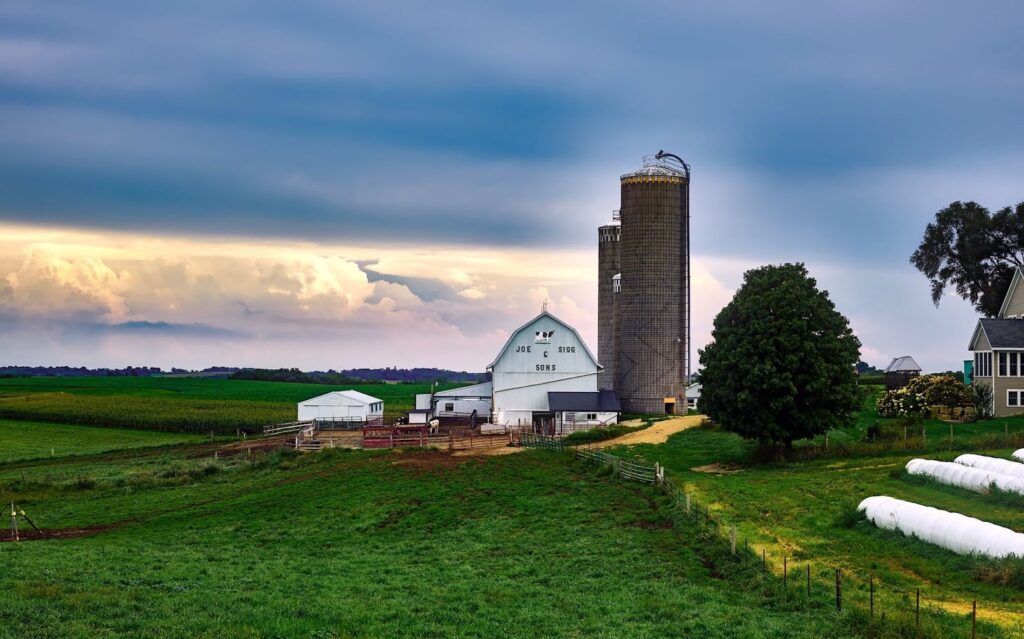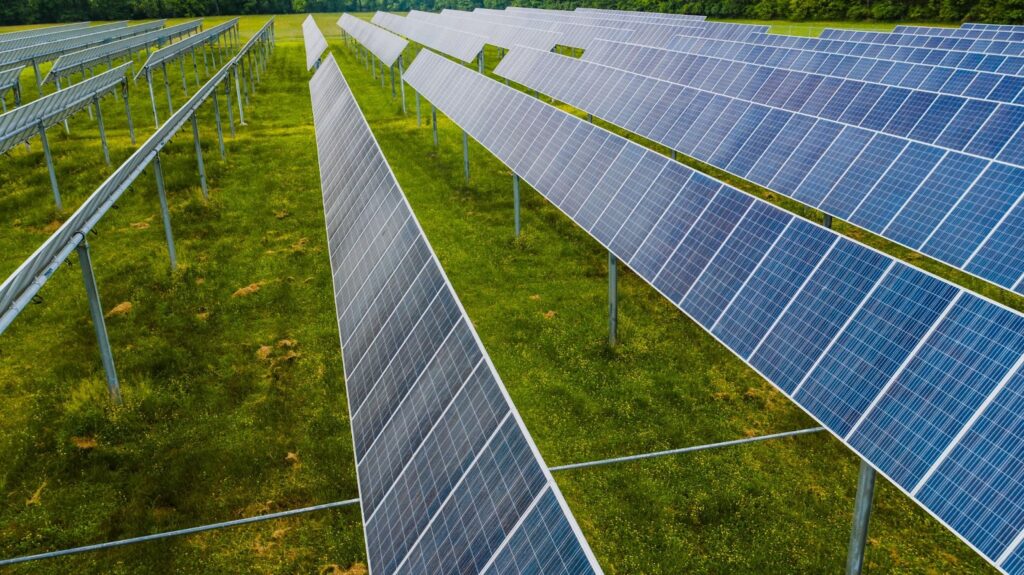
Farms use a lot of electricity, and with the ever-increasing cost of energy, it has never been more attractive to switch to solar energy.
This presents a conundrum for farmers. With so many aspects of a farm requiring power, many are left wondering if they need an on-grid or off-grid system – or both.
If this sounds like you, allow us to help you a little.
In this article, we explore the differences, benefits, and disadvantages of on and off-grid systems, so you can decide on the best one for your farming business.
Let’s get into it.
In a Nutshell
- On-grid solar systems are connected to the power grid and allow you to draw power from it when needed.
- Off-grid solar systems are completely independent and store excess solar energy in batteries.
- On-grid solar allows you to take advantage of net metering energy exchange but it is less versatile and unsuitable for remote areas that require power.
- Off-grid solar is more expensive to install but allows you to connect remote areas, such as electric fencing, irrigation pumps, and more.
- A hybrid solution is available, incorporating on-grid power and battery storage.
On-Grid and Off-Grid Solar – What Is the Difference?

The grid consists of all the infrastructure that carries electricity from the power plants to your property.
When you are “on-grid” this means your electricity is supplied from the grid via a meter that is installed on your premises. Off-grid is the opposite of this and means your electricity supply is gained from different means – a battery, for example.
Where solar power for farms is concerned, a solar system will not only generate enough power during daylight hours for you to run your farm’s operations, but it will also produce an excess of power.
On-grid solar systems allow this excess power to be sent to the grid and exchanged for energy credits that can be used when your solar panels aren’t producing energy, such as during dark hours.
Off-grid solar solutions have no connection to the grid. Instead, the excess power that the solar panels produce is sent to a battery. When the solar panels aren’t producing, the energy can be drawn from the battery instead.
Both setups have distinct advantages and disadvantages, and while on-grid farm solar might work for some, in other cases an off-grid farm solar installation may be better.
On-Grid Solar: Benefits and Disadvantages

On-Grid Solar Benefits
Solar power on the grid is the most widely used type of solar installation as it presents a good number of benefits.
For one, it costs less to install than off-grid solar. Why? Because it doesn’t require the use of batteries, which can significantly add to the total cost of the installation. Additionally, because on-grid systems require less equipment, they are often easier to install and almost always take up less space.
States – such as Colorado – that enjoy “net metering” will also find on-grid solar systems favorable. Net metering is a “like for like” energy exchange policy, meaning for every kWh of solar energy that you send to the grid, you gain a 1kWh credit for later use, essentially giving you access to (almost) free power whenever you need it.
On-Grid Solar Disadvantages
On the flip side, on-grid solar is a less versatile option. This is because everything you want to power has to be connected to the main electricity supply via wiring and cables. In fact, anything situated 100 yards or more from the electricity meter can present a challenge when trying to connect it to the grid.
While this doesn’t present much of a problem for the average homeowner, farms and agricultural businesses will find connecting more remote areas of their operations cost-prohibitive or downright impossible.
On-grid solar also means you are at the mercy of the utility provider and its infrastructure. This means you may be left without power during a blackout or extreme weather.
Additionally, net metering may change, so you never know if it’s going to be just as advantageous to send your excess energy to the grid later down the line.
Off-Grid Solar: Benefits and Disadvantages

Off-Grid Solar Benefits
Now, let’s move on to the benefits of having an off-the-grid farm.
The biggest and most valuable benefit for agricultural businesses is the ability to power systems, buildings, and equipment that are situated beyond the reach of a grid-based electricity supply.
For example, irrigation systems, soil monitoring systems, barns and outhouses or off-grid cabins, electric fencing, lighting, and more.
Where previously you would’ve had to use noisy, expensive, and polluting generators (not to mention the maintenance required to run them), an off-grid solar system will provide quiet, clean, and virtually free energy with very little maintenance involved.
Additionally, an off-grid setup is going to remove your reliance on the grid itself, which makes your farm more resilient when power outages occur.
As an example, if you need to run refrigeration units to store perishable produce, it won’t be long before your goods are destroyed if a prolonged power outage occurs in the middle of summer.
Finally, off-grid gives full energy independence. So, no matter how much energy bills rise or what utility companies do, you won’t be affected.
Ultimately, off-grid is arguably better for farms than on-grid because it significantly reduces operational and energy costs and can help turn more of a profit by allowing you to optimize and improve farming systems, such as irrigation.
Off-Grid Solar Disadvantages
Because off-grid solar systems require batteries, this makes them a more expensive option than on-grid solar. Depending on the brand and size of the battery, they range from a couple of thousand dollars up to $10,000 and beyond.
It won’t be just one battery, either. It’s likely that you are going to require several batteries to achieve the right amount of storage for your farm’s energy requirements.
While this is a definite downside, it’s worth mentioning that much of the cost of an off-grid solar system can be offset by the numerous available tax credits and incentives.
Off-Grid vs On-Grid Solar Power: The Pros and Cons

| On-Grid Pros | On-Grid Cons | Off-Grid Pros | Off-Grid Cons |
| Cheaper and easier to install Gives access to grid power when needed Can exchange solar energy for grid energy credits | You’re not energy-independent Not suitable for remote power needs Vulnerable to grid issues such as blackouts and failures | Complete energy independence Suitable for powering remote systems Provides reliable power 24/7 | More expensive to purchase and install You can’t take advantage of net metering |
How to Decide If You Need On-Grid or Off-Grid Solar Energy

It can be challenging to understand which type of solar energy system your farm requires. The best solution is to talk to an expert. A solar developer, such as 8760 Solar, can advise you and analyze your farm to determine the best option.
There are, however, a few questions you can ask yourself beforehand:
- How many systems need powering? Think about everything that requires electricity, no matter how large or small.
- Where are the systems that need powering? Are they close to your utility meter? Or are there a number of systems that could be considered “remote” (more than 100 yards from your utility meter)?
- How important is complete energy independence to you?
- How important is net metering to you?
- What is your budget? Is there room in it for solar batteries?
- How quickly do you want to see a return on your investment (ROI)? Do you want the fast ROI of an on-grid system? Or, are you happy to wait longer with an off-grid system?
What About Hybrid Solar Installations?

It probably won’t surprise you to learn that solar power for farm use can be installed in a hybrid system, meaning it utilizes batteries while still being connected to the grid.
This means you have the choice to draw power from a battery or from the grid, giving you full flexibility as and when required.
However, because there is still the need to be connected to the grid, the limitations on how far away from the utility meter it can reach still remain. This makes a hybrid system just as unsuitable for powering remote systems as an on-grid system.
If you wanted the best of both worlds, you would have to install two independent solar systems. One on-grid, and a separate off-grid system.
Chat With 8760 Solar
At 8760 Solar, we’re on hand to answer all your questions about on and off-grid farming and solar solutions. Whether you’re looking for a small solar power system or something large-scale, we’ll help you determine the best solar panels for farm use.
We can also advise you on the best off-grid solar panels, as well as on-grid solar installations. All you have to do is get in touch.
Text “READY” to 719 470-0254 or contact us via email: sales@8760solar.com, and we’ll answer you right away. We’re looking forward to setting you up with efficient, sustainable, and affordable power!
Frequently Asked Questions
Is Off-Grid Solar Better Than On-Grid?
Off-grid solar is not better than on-grid solar but it’s a different setup that can be more beneficial in certain circumstances. For example, farms and businesses that have to power systems that are situated far from the electricity meter will find an off-grid solution better.
What Are the Disadvantages of Off-Grid Solar System?
Off-grid solar systems cost more because they require the use of solar storage batteries. Depending on the size of the solar installation, several batteries may be required and these range from $2,000 – $15,000 and upwards in cost.
What Are the Disadvantages of On Grid Solar?
On-grid solar energy means you are still dependent on the grid despite generating your own electricity. If your utility company decides to change net metering to something less favorable, there’s not a lot you can do about it.
Additionally, on-grid solar cannot power remote systems, such as off-grid cabins or irrigation pumps.
Is It Worth It to Go Off-Grid With Solar?
It is worth having an off-grid solar energy setup if you need to power systems that cannot be connected to grid energy. Additionally, if you want complete independence from the grid and to achieve self-sufficiency, then off-grid solar is definitely worth it.
Which Is Better Off-Grid or Hybrid Solar?
Off-grid solar gives you complete independence from the grid and allows your solar panels to power systems that are situated far from the utility meter. Hybrid provides the benefits of battery storage but still faces the same distance restrictions as an on-grid system.
How Long Do Off-Grid Solar Panels Last?
Off-grid solar uses the same solar panels as an on-grid solar system. Therefore, the panels have a lifespan of 25 – 30 years or even longer.
